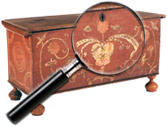Hans Andersen Brendekilde (Danish, 1857 to 1920)
Hans Anderson Brendekilde was a nineteenth century Danish artist who excelled in a variety of media. He began his artistic life as a sculptor but in his maturity committed himself entirely to oils and pastel. His paintings are often on a very large scale creating delightful enveloping vistas of the beautiful Danish countryside. He painted evocative landscape paintings, harsh social realist subjects and dramatic depictions of religious subjects. He enrolled in the Copenhagen Academy as a sculpture student between 1870 and 1881. Between 1800 and 1900 he was involved in the realist debate in Danish art.
He first exhibited in 1882 and was represented at Danish and international exhibitions, including the Worlds Colombian Fair, Chicago 1893, and the Exposition Universelle, Paris 1889. He was greatly influenced by the plein-air techniques and subjects matters of French Impressionism and inspired by naturalist, realist art. He almost always painted before the motif in nature, observing daily life and human life, only retouching his compositions in the final stages in the studio. Brendekilde applied the stylistic innovations of the French Impressionists to a personal and Danish subject matter.
About 1885 he started to paint large-scale works with landscapes and forests with white anemones and fresh green leaves, like The first anemones. With the photographic effect in the composition of landscapes and figures and the “rough” brushstrokes, Brendekilde elaborates a poetic representation of the harmony between nature and man.
Brendekilde exhibited regularly both in Denmark and throughout Europe. He was awarded annual medals both in 1892 for Spring and the following year for Une Route.
The work of Hans Anderson Brendekilde is represented in the Fyns Kunstmuseum, Odense, Denmark.
Information courtesy of Sotheby’s, April 2009.
